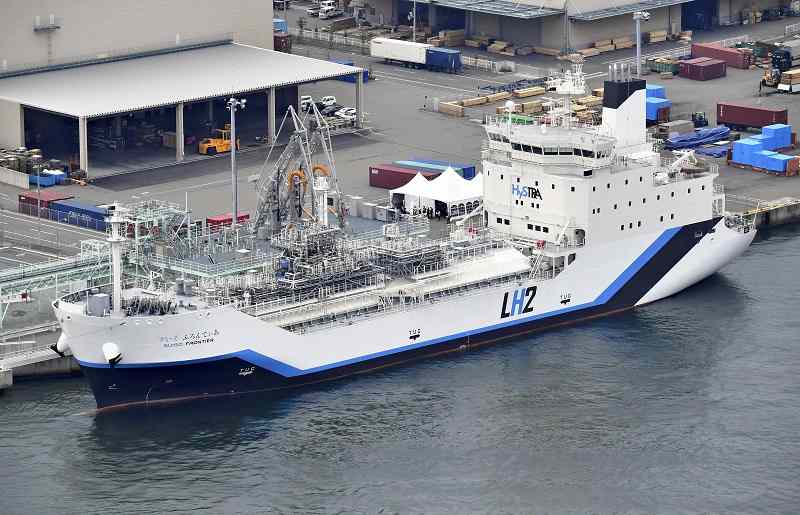
The Suiso Frontier, the world’s first liquefied hydrogen carrier, built by Kawasaki Heavy Industries, Ltd., is seen docked in Chuo Ward, Kobe, on May 24.
13:05 JST, June 28, 2021
BANGKOK — Large-scale, hydrogen energy-related projects involving Japanese companies are being implemented one after another in Australia.
Exports of coal and other fossil fuels has long supported the Australian economy, but in line with the global trend toward decarbonization, the nation is pressing ahead to transition into a “hydrogen giant.”
For Japanese companies, this presents opportunities to make use of their technological prowess and other assets.
In the southeastern state of Victoria, a project to generate hydrogen from brown coal, a low-quality coal that contains many impurities, is underway. Among the many Japanese companies involved are Electric Power Development Co. (J-Power), Iwatani Corp., Marubeni Corp. and Sumitomo Corp. Japan’s New Energy and Industrial Technology Development Organization (NEDO) and the Australian government are backing the project.
Brown coal is considered unsuitable for export because of fears of spontaneous combustion. But by converting it into a gaseous state through baking and adding steam, it produces high-purity hydrogen and carbon dioxide (CO2). The CO2 generated through the process will be stored underground in the future. “We will be able to provide a stable supply of hydrogen without the external emission of CO2,” an J-Power public relations official emphasized.
The hydrogen produced from coal will be transported on the world’s first liquefied hydrogen carrier, the Suiso Frontier, built by Kawasaki Heavy Industries, Ltd. The ship is capable of transporting hydrogen that, by being cooled to minus 253 C and turned into a liquid, has a volume 1/800th of the original gas. It is scheduled to transport hydrogen from Australia to a storage facility in Kobe within fiscal 2021.
With Australian brown coal cheap and available in mass quantities, the process will produce hydrogen at a lower cost than can be done in Japan, even factoring in the additional expenditure for shipping.
Idemitsu Kosan Co., a major oil wholesaler, is aiming to develop a “Hydrogen Valley” in the southeastern Australian state of New South Wales, in conjunction with local companies and entities, that will serve as a base for the production and export of hydrogen.
According to the Japan External Trade Organization (JETRO), as of this April, more than 10 Japanese companies are involved in hydrogen-related projects in Australia.
Itochu Corp. has signed a memorandum of understanding with a local company to explore the commercial potential for generating hydrogen and ammonia from coal. Toyota Motor Corp. has established a production and refueling station for fuel cell-powered vehicles on the outskirts of Melbourne.
For Australia, fossil fuels such as coal and liquefied natural gas (LNG) are the leading export goods propping up the country’s economy. But with decarbonization emerging as the prevalent trend in recent years, concerns are floating about what lies ahead.
Hydrogen, which does not release CO2 at the time of combustion, is regarded as a next-generation fuel. Aiming to become a major hydrogen-supplying nation, Australia mapped out its “National Hydrogen Strategy” in November 2019. In it, the government advocated a policy aiming for 10 billion Australian dollars (¥830 billion) of hydrogen exports in 2040.
“Low-cost clean hydrogen is where we have the potential to be a world leader,” Angus Taylor, Australia’s minister for energy and emissions reduction, said at a press conference in April.
Australia has seen relations with China, its largest trading partner, deteriorate in recent years. Last year, China placed limits on imports of Australian coal, which will likely serve to further push Australia to transition from coal to hydrogen.
“Industries getting involved with hydrogen are wide-ranging,” said Hiromi Sumi, an official at JETRO’s office in Sydney. “There will surely be room for even small- and medium-sized companies to gain access as a new business.”
Top Articles in Business
-

Prudential Life Insurance Plans to Fully Compensate for Damages Caused by Fraudulent Actions Without Waiting for Third-Party Committee Review
-

Narita Airport, Startup in Japan Demonstrate Machine to Compress Clothes for Tourists to Prevent People from Abandoning Suitcases
-

Japan, U.S. Name 3 Inaugural Investment Projects; Reached Agreement After Considerable Difficulty
-

Toyota Motor Group Firm to Sell Clean Energy Greenhouses for Strawberries
-

SoftBank Launches AI Service for Call Centers That Converts Harsh Customer Voices into Softer Voices
JN ACCESS RANKING
-

Japan PM Takaichi’s Cabinet Resigns en Masse
-

Japan Institute to Use Domestic Commercial Optical Lattice Clock to Set Japan Standard Time
-

Israeli Ambassador to Japan Speaks about Japan’s Role in the Reconstruction of Gaza
-

Man Infected with Measles Reportedly Dined at Restaurant in Tokyo Station
-

Videos Plagiarized, Reposted with False Subtitles Claiming ‘Ryukyu Belongs to China’; Anti-China False Information Also Posted in Japan






















